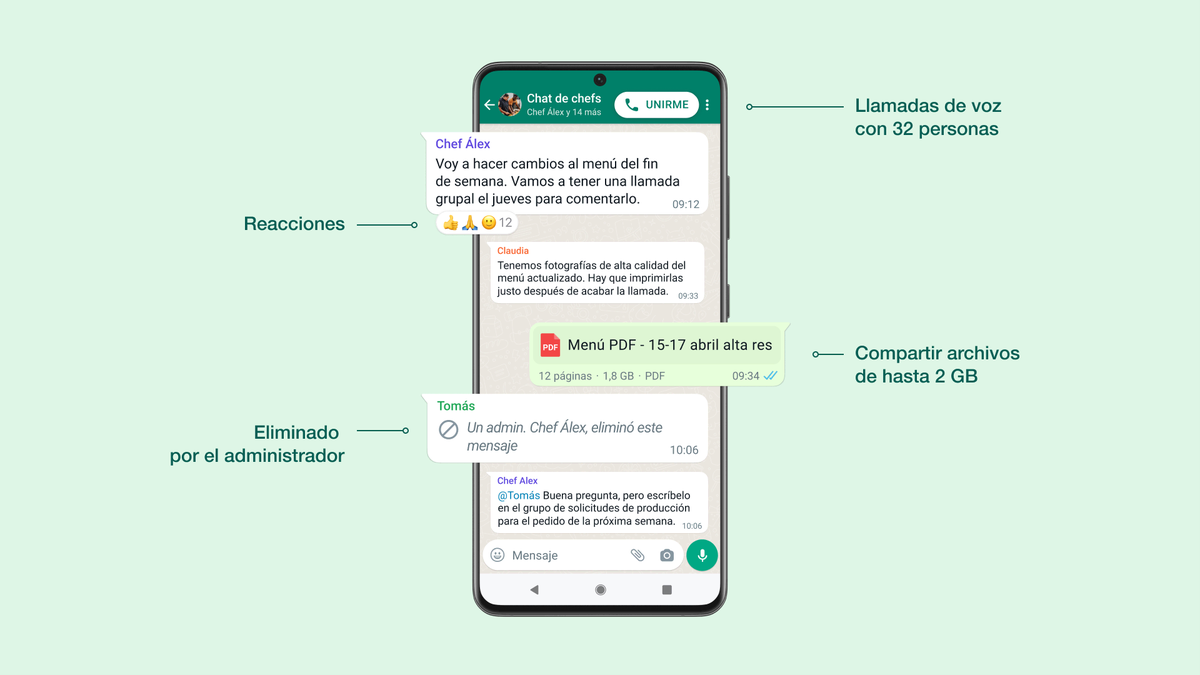WhatsApp’s future plans are to grant even more power to group administrators. Currently, they can kick participants, designate which other users to share the position with, or choose who can participate within a chat. WhatsApp has announced this Thursday that, in addition, it will allow them to delete any message from the conversations. The company also plans to launch new features in the coming months to react with emojis to messages, send larger files and organize groups to find them more easily.
“All administrators will be able to remove erroneous or problematic messages from chats to help maintain security and respect in groups,” said Jyoti Sood, WhatsApp product manager, during a video call with a group of journalists, communicating a series of changes in the application. When deleting a message, it will be replaced by a text that will warn other users that the administrator has deleted it. The company has not specified the specific date on which all the new functions will be available.
In theory, in the coming weeks, users will also be able to react with emojis to a specific message, as is the case with other social networks and messaging services. While Facebook allows you to use various drawings —for example, sad, surprised or angry faces—, on Instagram you can use a heart, and on Telegram, a hand with the thumbs up. On WhatsApp, according to Sood, users will also “be able to send reactions to express their opinions in the chat without having to send new messages that increase the information overload that their friends and family may feel.”
Among the next new features of the platform, there are also audio calls of up to 32 people “with a totally new design” and the possibility of sharing larger files. While currently the limit is 100MB, the company has announced that it will soon allow users to send photos, videos or documents of up to 2GB.
Organize group chats
The tech giant is also working on a feature called “communities,” which will allow administrators to bring together multiple groups within the same structure. For example, in the case of a school, an administrator could group several chats in the same place: the one for the entire center, those for parents of each particular course, one for teachers only, one for carpooling on the way to school school or extracurricular activities. In this way, each user could quickly consult all the available groups at a glance.
“We created WhatsApp ‘communities’ to make it much easier to organize all your group chats and find information,” Marck Zuckerberg, president and CEO of Meta (the company that encompasses WhatsApp, Facebook and Instagram), said in a statement. Admins can choose which conversations become part of a community by creating new chats or linking existing ones. In addition, they can send messages to members of all groups or only to certain groups.
WhatsApp intends to test this function, reminiscent of applications such as Discord or Slack, in the coming months. His intention is to launch it first in some countries —which he has not specified— and then he will implement it globally. “Today, for many users, the essence of WhatsApp is the group chats of their friends and family where they can connect privately with the people closest to them,” Sood said.
Now, the company intends to “take advantage of that feeling of closeness” to make it easier for users to also stay in touch with different communities: from their neighborhood to school through work or places of worship. Zuckerberg believes that this feature can be useful for people who want to discuss different topics with their co-workers or talk about what is happening on their street or building with their neighbors.
WhatsApp claims to have taken into account the privacy of users to design this new function. First of all, it hides the phone numbers of those who belong to the community. “They will only be visible to administrators and other people who are in the same group,” Alice Newton-Rex, product director of WhatsApp, assured during a video call. As is the case today, users will be able to decide who can add them to a group and also leave communities they no longer want to be a part of.
Multiple hoaxes and misinformation circulate daily on WhatsApp. The company, which is aware of this, announces from time to time some measure to try to stop its spread. “With the introduction of ‘communities’, messages that have already been forwarded can only be forwarded to one group at a time, instead of five, which is the current forwarding limit,” says the technology company. A study carried out by a group of researchers from the Federal University of Minas Gerais (Brazil) and the Massachusetts Institute of Technology (MIT) concluded in 2019 that limiting the forwarding of messages on the platform slows down the spread of disinformation, but does not stop it completely.

